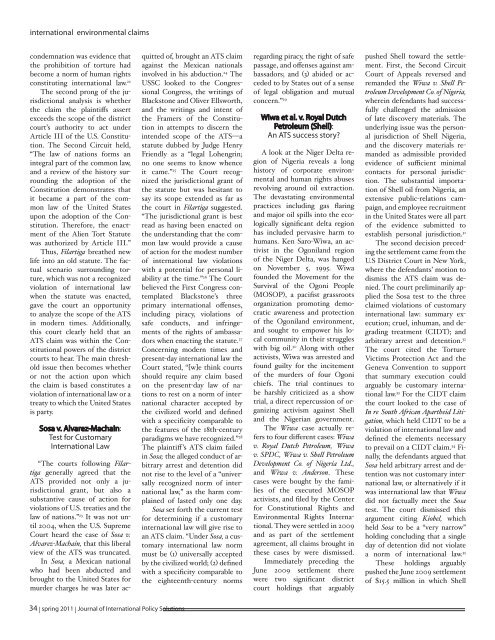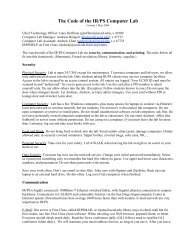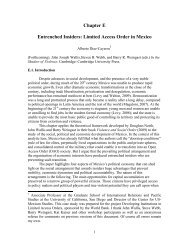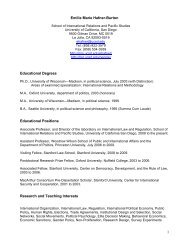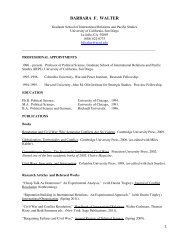to download the full journal. (1.2MB PDF) - School of International ...
to download the full journal. (1.2MB PDF) - School of International ...
to download the full journal. (1.2MB PDF) - School of International ...
You also want an ePaper? Increase the reach of your titles
YUMPU automatically turns print PDFs into web optimized ePapers that Google loves.
international environmental claims<br />
condemnation was evidence that<br />
<strong>the</strong> prohibition <strong>of</strong> <strong>to</strong>rture had<br />
become a norm <strong>of</strong> human rights<br />
constituting international law. 22<br />
The second prong <strong>of</strong> <strong>the</strong> jurisdictional<br />
analysis is whe<strong>the</strong>r<br />
<strong>the</strong> claim <strong>the</strong> plaintiffs assert<br />
exceeds <strong>the</strong> scope <strong>of</strong> <strong>the</strong> district<br />
court’s authority <strong>to</strong> act under<br />
Article III <strong>of</strong> <strong>the</strong> U.S. Constitution.<br />
The Second Circuit held,<br />
“The law <strong>of</strong> nations forms an<br />
integral part <strong>of</strong> <strong>the</strong> common law,<br />
and a review <strong>of</strong> <strong>the</strong> his<strong>to</strong>ry surrounding<br />
<strong>the</strong> adoption <strong>of</strong> <strong>the</strong><br />
Constitution demonstrates that<br />
it became a part <strong>of</strong> <strong>the</strong> common<br />
law <strong>of</strong> <strong>the</strong> United States<br />
upon <strong>the</strong> adoption <strong>of</strong> <strong>the</strong> Constitution.<br />
Therefore, <strong>the</strong> enactment<br />
<strong>of</strong> <strong>the</strong> Alien Tort Statute<br />
was authorized by Article III.”<br />
Thus, Filartiga brea<strong>the</strong>d new<br />
life in<strong>to</strong> an old statute. The factual<br />
scenario surrounding <strong>to</strong>rture,<br />
which was not a recognized<br />
violation <strong>of</strong> international law<br />
when <strong>the</strong> statute was enacted,<br />
gave <strong>the</strong> court an opportunity<br />
<strong>to</strong> analyze <strong>the</strong> scope <strong>of</strong> <strong>the</strong> ATS<br />
in modern times. Additionally,<br />
this court clearly held that an<br />
ATS claim was within <strong>the</strong> Constitutional<br />
powers <strong>of</strong> <strong>the</strong> district<br />
courts <strong>to</strong> hear. The main threshold<br />
issue <strong>the</strong>n becomes whe<strong>the</strong>r<br />
or not <strong>the</strong> action upon which<br />
<strong>the</strong> claim is based constitutes a<br />
violation <strong>of</strong> international law or a<br />
treaty <strong>to</strong> which <strong>the</strong> United States<br />
is party.<br />
Sosa v. Alvarez-Machain:<br />
Test for Cus<strong>to</strong>mary<br />
<strong>International</strong> Law<br />
“The courts following Filartiga<br />
generally agreed that <strong>the</strong><br />
ATS provided not only a jurisdictional<br />
grant, but also a<br />
substantive cause <strong>of</strong> action for<br />
violations <strong>of</strong> U.S. treaties and <strong>the</strong><br />
law <strong>of</strong> nations.” 23 It was not until<br />
2004, when <strong>the</strong> U.S. Supreme<br />
Court heard <strong>the</strong> case <strong>of</strong> Sosa v.<br />
Alvarez-Machain, that this liberal<br />
view <strong>of</strong> <strong>the</strong> ATS was truncated.<br />
In Sosa, a Mexican national<br />
who had been abducted and<br />
brought <strong>to</strong> <strong>the</strong> United States for<br />
murder charges he was later acquitted<br />
<strong>of</strong>, brought an ATS claim<br />
against <strong>the</strong> Mexican nationals<br />
involved in his abduction. 24 The<br />
USSC looked <strong>to</strong> <strong>the</strong> Congressional<br />
Congress, <strong>the</strong> writings <strong>of</strong><br />
Blacks<strong>to</strong>ne and Oliver Ellsworth,<br />
and <strong>the</strong> writings and intent <strong>of</strong><br />
<strong>the</strong> Framers <strong>of</strong> <strong>the</strong> Constitution<br />
in attempts <strong>to</strong> discern <strong>the</strong><br />
intended scope <strong>of</strong> <strong>the</strong> ATS—a<br />
statute dubbed by Judge Henry<br />
Friendly as a “legal Lohengrin;<br />
no one seems <strong>to</strong> know whence<br />
it came.” 25 The Court recognized<br />
<strong>the</strong> jurisdictional grant <strong>of</strong><br />
<strong>the</strong> statute but was hesitant <strong>to</strong><br />
say its scope extended as far as<br />
<strong>the</strong> court in Filartiga suggested.<br />
“The jurisdictional grant is best<br />
read as having been enacted on<br />
<strong>the</strong> understanding that <strong>the</strong> common<br />
law would provide a cause<br />
<strong>of</strong> action for <strong>the</strong> modest number<br />
<strong>of</strong> international law violations<br />
with a potential for personal liability<br />
at <strong>the</strong> time.” 26 The Court<br />
believed <strong>the</strong> First Congress contemplated<br />
Blacks<strong>to</strong>ne’s three<br />
primary international <strong>of</strong>fenses,<br />
including piracy, violations <strong>of</strong><br />
safe conducts, and infringements<br />
<strong>of</strong> <strong>the</strong> rights <strong>of</strong> ambassadors<br />
when enacting <strong>the</strong> statute. 27<br />
Concerning modern times and<br />
present-day international law <strong>the</strong><br />
Court stated, “[w]e think courts<br />
should require any claim based<br />
on <strong>the</strong> present-day law <strong>of</strong> nations<br />
<strong>to</strong> rest on a norm <strong>of</strong> international<br />
character accepted by<br />
<strong>the</strong> civilized world and defined<br />
with a specificity comparable <strong>to</strong><br />
<strong>the</strong> features <strong>of</strong> <strong>the</strong> 18th-century<br />
paradigms we have recognized.” 28<br />
The plaintiff’s ATS claim failed<br />
in Sosa; <strong>the</strong> alleged conduct <strong>of</strong> arbitrary<br />
arrest and detention did<br />
not rise <strong>to</strong> <strong>the</strong> level <strong>of</strong> a “universally<br />
recognized norm <strong>of</strong> international<br />
law,” as <strong>the</strong> harm complained<br />
<strong>of</strong> lasted only one day.<br />
Sosa set forth <strong>the</strong> current test<br />
for determining if a cus<strong>to</strong>mary<br />
international law will give rise <strong>to</strong><br />
an ATS claim. “Under Sosa, a cus<strong>to</strong>mary<br />
international law norm<br />
must be (1) universally accepted<br />
by <strong>the</strong> civilized world; (2) defined<br />
with a specificity comparable <strong>to</strong><br />
<strong>the</strong> eighteenth-century norms<br />
regarding piracy, <strong>the</strong> right <strong>of</strong> safe<br />
passage, and <strong>of</strong>fenses against ambassadors;<br />
and (3) abided or acceded<br />
<strong>to</strong> by States out <strong>of</strong> a sense<br />
<strong>of</strong> legal obligation and mutual<br />
concern.” 29<br />
Wiwa et al. v. Royal Dutch<br />
Petroleum (Shell):<br />
An ATS success s<strong>to</strong>ry?<br />
A look at <strong>the</strong> Niger Delta region<br />
<strong>of</strong> Nigeria reveals a long<br />
his<strong>to</strong>ry <strong>of</strong> corporate environmental<br />
and human rights abuses<br />
revolving around oil extraction.<br />
The devastating environmental<br />
practices including gas flaring<br />
and major oil spills in<strong>to</strong> <strong>the</strong> ecologically<br />
significant delta region<br />
has included pervasive harm <strong>to</strong><br />
humans. Ken Saro-Wiwa, an activist<br />
in <strong>the</strong> Ogoniland region<br />
<strong>of</strong> <strong>the</strong> Niger Delta, was hanged<br />
on November 5, 1995. Wiwa<br />
founded <strong>the</strong> Movement for <strong>the</strong><br />
Survival <strong>of</strong> <strong>the</strong> Ogoni People<br />
(MOSOP), a pacifist grassroots<br />
organization promoting democratic<br />
awareness and protection<br />
<strong>of</strong> <strong>the</strong> Ogoniland environment,<br />
and sought <strong>to</strong> empower his local<br />
community in <strong>the</strong>ir struggles<br />
with big oil. 30 Along with o<strong>the</strong>r<br />
activists, Wiwa was arrested and<br />
found guilty for <strong>the</strong> incitement<br />
<strong>of</strong> <strong>the</strong> murders <strong>of</strong> four Ogoni<br />
chiefs. The trial continues <strong>to</strong><br />
be harshly criticized as a show<br />
trial, a direct repercussion <strong>of</strong> organizing<br />
activism against Shell<br />
and <strong>the</strong> Nigerian government.<br />
The Wiwa case actually refers<br />
<strong>to</strong> four different cases: Wiwa<br />
v. Royal Dutch Petroleum, Wiwa<br />
v. SPDC, Wiwa v. Shell Petroleum<br />
Development Co. <strong>of</strong> Nigeria Ltd.,<br />
and Wiwa v. Anderson. These<br />
cases were bought by <strong>the</strong> families<br />
<strong>of</strong> <strong>the</strong> executed MOSOP<br />
activists, and filed by <strong>the</strong> Center<br />
for Constitutional Rights and<br />
Environmental Rights <strong>International</strong>.<br />
They were settled in 2009<br />
and as part <strong>of</strong> <strong>the</strong> settlement<br />
agreement, all claims brought in<br />
<strong>the</strong>se cases by were dismissed.<br />
Immediately preceding <strong>the</strong><br />
June 2009 settlement <strong>the</strong>re<br />
were two significant district<br />
court holdings that arguably<br />
pushed Shell <strong>to</strong>ward <strong>the</strong> settlement.<br />
First, <strong>the</strong> Second Circuit<br />
Court <strong>of</strong> Appeals reversed and<br />
remanded <strong>the</strong> Wiwa v. Shell Petroleum<br />
Development Co. <strong>of</strong> Nigeria,<br />
wherein defendants had success<strong>full</strong>y<br />
challenged <strong>the</strong> admission<br />
<strong>of</strong> late discovery materials. The<br />
underlying issue was <strong>the</strong> personal<br />
jurisdiction <strong>of</strong> Shell Nigeria,<br />
and <strong>the</strong> discovery materials remanded<br />
as admissible provided<br />
evidence <strong>of</strong> sufficient minimal<br />
contacts for personal jurisdiction.<br />
The substantial importation<br />
<strong>of</strong> Shell oil from Nigeria, an<br />
extensive public-relations campaign,<br />
and employee recruitment<br />
in <strong>the</strong> United States were all part<br />
<strong>of</strong> <strong>the</strong> evidence submitted <strong>to</strong><br />
establish personal jurisdiction. 31<br />
The second decision preceding<br />
<strong>the</strong> settlement came from <strong>the</strong><br />
U.S District Court in New York,<br />
where <strong>the</strong> defendants’ motion <strong>to</strong><br />
dismiss <strong>the</strong> ATS claim was denied.<br />
The court preliminarily applied<br />
<strong>the</strong> Sosa test <strong>to</strong> <strong>the</strong> three<br />
claimed violations <strong>of</strong> cus<strong>to</strong>mary<br />
international law: summary execution;<br />
cruel, inhuman, and degrading<br />
treatment (CIDT); and<br />
arbitrary arrest and detention. 32<br />
The court cited <strong>the</strong> Torture<br />
Victims Protection Act and <strong>the</strong><br />
Geneva Convention <strong>to</strong> support<br />
that summary execution could<br />
arguably be cus<strong>to</strong>mary international<br />
law. 33 For <strong>the</strong> CIDT claim<br />
<strong>the</strong> court looked <strong>to</strong> <strong>the</strong> case <strong>of</strong><br />
In re South African Apar<strong>the</strong>id Litigation,<br />
which held CIDT <strong>to</strong> be a<br />
violation <strong>of</strong> international law and<br />
defined <strong>the</strong> elements necessary<br />
<strong>to</strong> prevail on a CIDT claim. 34 Finally,<br />
<strong>the</strong> defendants argued that<br />
Sosa held arbitrary arrest and detention<br />
was not cus<strong>to</strong>mary international<br />
law, or alternatively if it<br />
was international law that Wiwa<br />
did not factually meet <strong>the</strong> Sosa<br />
test. The court dismissed this<br />
argument citing Kiobel, which<br />
held Sosa <strong>to</strong> be a “very narrow”<br />
holding concluding that a single<br />
day <strong>of</strong> detention did not violate<br />
a norm <strong>of</strong> international law. 35<br />
These holdings arguably<br />
pushed <strong>the</strong> June 2009 settlement<br />
<strong>of</strong> $15.5 million in which Shell<br />
34 | spring 2011 | Journal <strong>of</strong> <strong>International</strong> Policy Solutions


